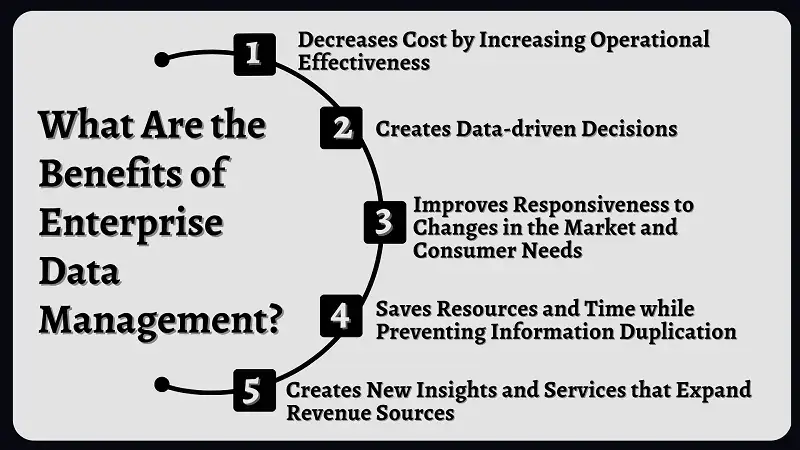Hello there, today in this blog post, we are going to discuss why is enterprise data management essential for your business growth. So keep reading.
There is no doubt that data is becoming increasingly important in today’s business world. To remain competitive, businesses need to accurately determine, seamlessly integrate, and efficiently access data for both internal business applications and external communications. This is where enterprise data management comes in.
Enterprise data management helps businesses to address issues like data security, accessibility, and quality, ensuring that all departments have simple access to reliable data in real time. This is crucial because it can assist businesses in avoiding problems that might result from improper data handling. Enterprise data management can also enhance productivity and communication within a business.
In this write-up, we’ll discuss how an effective enterprise data management strategy will help your business grow, and how outsourcing data management services help to ensure that your data is being managed effectively, accurately, and at a reduced cost.
Why is Enterprise Data Management Essential for Your Business?
Enterprise data management is crucial for businesses because it provides a standardized system for managing, monitoring, storing, securing, and accessing data. This streamlined method guarantees that businesses can easily locate, examine, and utilize their data to make the best decisions at the appropriate time. Here are some reasons why is enterprise data management essential for your business growth:
1. The Latest Relevant Data
Timely and accurate data are essential for making sound business decisions. With enterprise data management solutions, you can be confident that your data is always up-to-date and accurate. This can give you a competitive edge in your industry and help you make better decisions for your business.
2. Exceptional Value
Enterprise data management can help you better understand your customers and what they need from your business. This insight can help you tailor your products and services to meet their needs, giving you a competitive advantage in the market.
3. Operational Efficiency
It helps streamline your business operations by automating tasks and processes that are traditionally done manually. This can free up time for your employees to focus on other tasks that add value to your business.
4. Enhanced Client Experience
Happy customers are key to any successful business. With enterprise data management solutions, you can have peace of mind knowing that your customer’s data is safe and secure. This can improve their experience with your company and lead to business growth.
What Are the Benefits of Enterprise Data Management?
Enterprise data management can be used to support a variety of business objectives, including improving customer service, increasing revenues, and protecting brand reputation. It can also help organizations to comply with regulatory requirements and to avoid or mitigate fines and other penalties.

There are many benefits of implementing a well-planned enterprise data management strategy, including:
1. Decreases Cost by Increasing Operational Effectiveness
A major benefit of an effective enterprise data management strategy is the decrease in costs associated with running the business. By streamlining processes and making data more readily accessible, businesses can save money on labor, materials, and other resources. By centralizing data and making it more accessible, enterprises can make their processes more efficient and reduce overall costs.
2. Creates Data-driven Decisions
Data-driven decision-making is becoming increasingly important in today’s business world. With the ability to track and analyze vast amounts of information, businesses can gain insights into trends and customer behavior that would otherwise be unavailable. This allows businesses to make better decisions about where to allocate resources and how to adjust their products or services to meet changing needs.
3. Improves Responsiveness to Changes in the Market and Consumer Needs
Having a centralized repository of accurate and up-to-date data allows enterprises to be more agile in their responses to changes in the marketplace. With the help of well-managed data infrastructure in place, businesses can respond quickly to changes in the marketplace or consumer demand. This can be a major competitive advantage, particularly in industries where innovation is key to success.
4. Saves Resources and Time while Preventing Information Duplication
Enterprise data management can save your company time and money by reducing duplicate data, which can lead to inefficiencies and wasted resources. In addition, EDM can help prevent the creation of new duplicates by providing a single source of truth for your organization’s data.
5. Creates New Insights and Services that Expand Revenue Sources
EDM can enable your organization to create entirely new products and services or to enhance existing offerings. For example, by integrating data from disparate sources, you can develop new insights that could be used to improve customer service or target new marketing campaigns. These innovations can lead to increased sales and revenue growth.
What Are the Challenges of Enterprise Data Management?
Enterprise data management can be a complex and challenging undertaking for any organization. Here are some of the challenges that come with enterprise data management.
1. Keeping Track of The Data
Perhaps the most difficult challenge is simply keeping track of all the data that is being generated by an organization. This data can come from a variety of sources, including customer interactions, financial transactions, and even employee records. With so much data to keep track of, it can be difficult for organizations to maintain an accurate and up-to-date view of their business. This can further lead to inefficiencies and wasted time as employees search for information that’s buried in a sea of other data.
2. Securing All the Data
Another challenge that comes with enterprise data management is ensuring that this data is secure. Since this data is often sensitive, it must be properly protected from unauthorized access. This can be a challenging task, particularly for organizations that have a lot of data to manage. Additionally, organizations must also be careful to protect their data from accidental deletion or alteration.
3. Employee’s Internal Frustrations
Internal frustration and disputes between employees can happen for a variety of reasons, such as different departments not being able to access the same data or employees feeling like they don’t have the necessary tools to do their job effectively. This can lead to a lot of wasted time and energy as employees try to work around these issues, which can eventually lead to lower morale and productivity.
Why Should You Outsource Data Management Services?
Having an effective data management system is key to running a successful business. One needs to think about security, storage, backup and recovery, and regulatory compliance when overseeing enterprise data. Failing to do so can lead to operational disruptions, customer data loss, and reputational damage. Many businesses prefer to outsource data management services, as handling larger datasets can prove difficult in-house. Doing so comes with its benefits, such as cost savings, improved security, and access to expert knowledge.
1. Additional Cost Savings
When you outsource data management services, you can save a lot of money on overhead costs. You don’t have to invest in expensive software or hardware, and you don’t have to pay for employee training.
2. Increased Efficiency
It frees up your time so you can focus on other aspects of your business. When you outsource data management services, you can rest assured that your data is being managed by experts. This allows you to focus on running and growing your business, rather than managing data yourself.
3. Improved Quality
When you outsource data management services, you can improve the quality of your data. This is because expert professionals will have the knowledge and experience to ensure that your data is accurate and up-to-date.
Take Away: Why Is Enterprise Data Management Essential For Your Business
An effective enterprise data management strategy starts with understanding what data you have and where it resides within your organization. Once you have a clear picture of your organizational data, you can begin to develop a plan for how to best utilize it. By implementing an effective enterprise data management strategy, you can give your business a competitive edge in the digital age. By having access to organized and accurate data, you can make better decisions, improve operational efficiency, and create new revenue streams.
However, organizations are under constant pressure to do more with less. They are looking for ways to improve efficiency and cut costs. One way they are doing this is by outsourcing data quality management services. This can be a great way to reduce expenses and free up internal resources. When done correctly, it can also help improve the quality of your data and make it more actionable.
Author Bio:
Jessica is a Content Strategist, currently engaged at Data-Entry-India.com- a globally renowned data entry and management company -for over five years. She spends most of her time reading and writing about transformative data solutions, helping businesses to tap into their data assets and make the most out of them. So far, she has written over 2000 articles on various data functions, including data entry, data processing, data management, data hygiene, and other related topics. Besides this, she also writes about eCommerce data solutions, helping businesses uncover rich insights and stay afloat amidst the transforming market landscapes.



